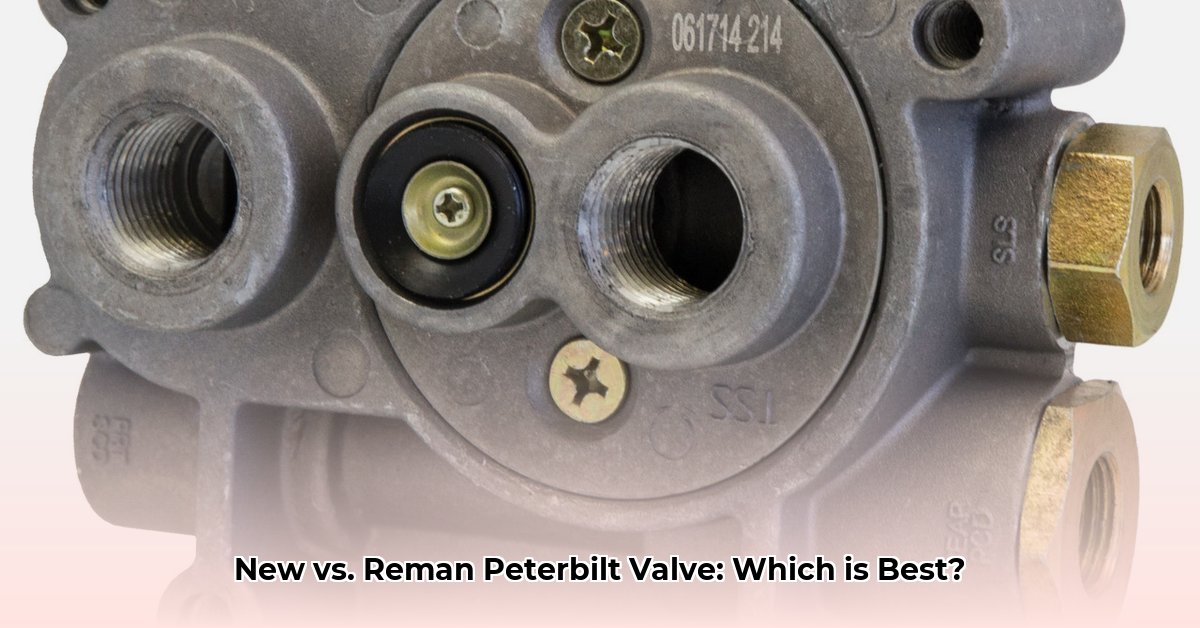
Keeping your Peterbilt on the road requires reliable parts, and the tractor protection valve is no exception. This guide helps you choose between a new Bendix TP-5 (formerly VM-2) valve and a remanufactured one, considering cost, lifespan, reliability, and warranty. For more detailed information on this valve's function, see this helpful guide: Tractor Protection Valve Info. Whether you manage a fleet or maintain your own truck, this guide empowers informed decision-making.
Understanding Your Peterbilt's Air Brake Guardian
The Bendix TP-5 (or VM-2) valve is crucial for your trailer braking system. It manages air pressure, ensuring safe and controlled stops, especially important with heavy loads or challenging road conditions. It acts as the air traffic controller for your braking system, distributing air pressure to the trailer brakes.
New vs. Reman: A Functional Face-Off
Both new and remanufactured TP-5 valves perform the same core functions: distributing air pressure to trailer brakes and managing the air supply. However, key differences affect reliability and longevity. It's analogous to a rebuilt versus a brand-new engine—both function, but one offers superior expected lifespan.
Comparative Analysis: New vs. Remanufactured Valves
Let's compare new and remanufactured valves across key factors:
Cost
- New: Higher initial investment; expect a significant price difference.
- Remanufactured: Significantly lower initial cost, offering substantial savings. However, this must be weighed against potential future repair costs or premature replacement.
Reliability
- New: Generally higher reliability due to new components and rigorous testing. The risk of failure is significantly lower. What are the long-term cost implications of a sudden failure?
- Remanufactured: Reliability varies depending on the remanufacturing process and parts quality. A higher potential for failure and shorter lifespan exists.
Warranty
- New: Typically longer and more comprehensive coverage (often 1-2 years), offering peace of mind and protection against defects.
- Remanufactured: Usually shorter and more limited (often 90 days to 1 year); carefully review warranty terms.
Maintenance
- New: Minimal maintenance is needed; infrequent inspections suffice.
- Remanufactured: May require more frequent inspection to proactively identify and address potential issues early. The importance of regular maintenance cannot be overstated for both options.
Installation and Preventative Maintenance
Installation should be performed by a qualified mechanic. Improper installation can lead to brake failure. Preventative maintenance extends valve lifespan for both new and remanufactured units.
Routine Maintenance Steps:
- Visual Inspection: Regularly check for damage, leaks, or corrosion.
- Air System Tests: Periodically test the entire air brake system for proper function. Low air pressure indicates potential problems.
- Professional Service: Schedule regular inspections by a qualified mechanic for early problem detection.
Decision-Making Guide: New or Reman?
The following decision tree helps you select the best option based on your needs:
[Start] --> [Budget a Major Concern?] --> Yes: Remanufactured No: --> [Reliability Paramount?] --> Yes: New No: Consider Factors Carefully
Key Takeaways
Selecting between new and remanufactured Bendix TP-5 valves depends on several factors. New valves offer greater reliability and warranty protection but at a higher initial cost. Remanufactured valves are more economical upfront but present a higher risk of earlier failure. Prioritize safety and choose a reputable supplier for either option. Regular maintenance is crucial for longevity regardless of your choice.
Resources
- Bendix Website (Example - Replace with actual link)
- Relevant Safety Regulations (Example - Replace with actual link)